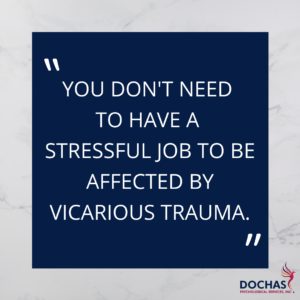It’s Kim here, and welcome back for another video! Life just seems to get more and more complicated, especially as of late. We’re exposed to heartbreaking, traumatic events and stories, and this can really take a toll on our mental health. There are a lot of terms associated with traumatic stress. We’ve talked about compassion fatigue, post-traumatic stress disorder, and burnout, but vicarious trauma is closely linked in this group, too.
So, what is vicarious trauma? Watch the video to find out, or scroll down to read more.
What is vicarious trauma?
It’s when our worldview, or our fundamental beliefs about the world, change as a result of being repeatedly exposed to traumatic information.
It doesn’t have to be something that happened to us directly. Vicarious trauma often occurs from stories we hear about traumatic experiences.
Imagine someone who works closely with domestic violence survivors. They don’t experience the trauma of domestic abuse firsthand, but their repeated exposure to other people’s stories makes them start to believe that no relationship could ever be healthy.
Their worldview has changed.
Vicarious trauma can happen to anyone
We often think of the usual suspects for vicarious trauma and PTSD: police officers, first responders, military, psychologists, psychiatrists, or doctors.
But there are so many who we don’t think of as much, like people who work in animal shelters, news reporters, and social workers.
You don’t need to have a stressful job title to be affected. It can even happen by simply hearing traumatic stories from a friend.
In this article, Francoise Mathieu says that healthcare workers can develop all three conditions: vicarious trauma, compassion fatigue, and burnout. And, the distinction between them isn’t always clear. Compassion fatigue and burnout can often lead to vicarious trauma.
Over time this repeated exposure to trauma (firsthand or not) can introduce symptoms of PTSD. These symptoms can be flashbacks, intrusive images or thoughts, hopelessness, and even suicidal ideation.
Prevent vicarious trauma with these tips
Keep your eye out for our next video on our YouTube channel. We’re talking all about how to use mindfulness-based stress reduction strategies to help with vicarious trauma. And in the meantime, here are some ways to prevent vicarious trauma:
- Build a support group around you, or reach out to a support network
- Limit your exposure to traumatic stress (this could mean not watching the news or staying off social media)
- Be honest with yourself and others about what causes you stress
As always, if you’re in need of support we’re here to help. Give us a call at 780-446-0300 or send us an email at info@dochaspsych.com.
About Dochas Psychological
Dochas Psychological Services is a well-established and trusted therapy clinic located in Spruce Grove, Alberta. At Dochas we value the idea that everyone deserves a safe space. Through connection and education, our team works hard to build a trustworthy relationship with each of our clients. It is our goal to create a community for our clients to feel like they belong.
Disclaimer
Information provided through Dochas Psychological Services blogs or vlogs are meant for educational purposes only. They are NOT medical or mental health advice. You can read more about our disclaimer here.











